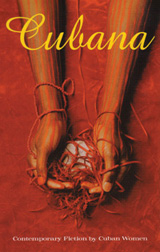
CONTEMPORARY FICTION BY CUBAN WOMEN
Cubana is more than just an anthology; it is a book with a mission. In her introduction, Cuban writer Mirta Yáñez explains the enigma of women in Cuban literature. She argues that the 1959 revolution that promised equality for women was coupled with a patriarchal machismo and rhetoric about social responsibility that effectively stifled their voices. There were just too many things that women were not supposed to discuss. Cubana is a slim volume that allows their voices to be heard by a wider audience.
Yáñez' strident introduction almost threatens the reader not to feel challenged by the subsequent stories. Many of them were handpicked from an earlier, untranslated volume called Pillars of Salt, a collection that attempted to define "Cubana" feminism and allow women to write about previously taboo subjects. However, any fears I may have had that I was about to be attacked by a cavalcade of erotica, political polemicism and woeful tales of domestic drudgery were soon dispelled. What I found instead was a collection of well-crafted pieces from some outrageously talented writers. Some are old, some young, not all are fresh to the page, but they are all relative unknowns, many both inside and outside of Cuba.
The collection consists of both new and previously untranslated pieces. There is a gritty realism to many of them, reflecting Cubana's aim to allow Cuban women to write honestly about their lives. There are 16 pieces, mostly short, each of which distinctively and elegantly covers the mundane, the wonderful, and the painful from the lives of Cuban women. I wish there were space here to discuss them all individually. Highlights include Marilyn Bobes' opener, which features three friends mourning a fourth, whose dissolute choices force them to examine the roles they have chosen. Mylene Fernández Pintado's excellent "Anhedonioa" contrasts two women, and the apparent cowardice that causes one to adopt a traditional woman's role, and the unhappiness that dogs the other's decision to forge her own path. Other standouts were Uva de Aragón's criticism of domesticity and ageing; Achy Obejas' examination of the search for identity in the expat experience; and Aida Bahr's more wistful and abstract musing about loss and family. The subtlety of the stories, both in the subject matter and the telling, provide an insight into the subtlety with which women's voices were curtailed. In this regard, Cubana can justifiably claim complete success in its aims.
There is so much to say about this wonderful collection, and so little space, that I am finding it difficult
to express exactly how good I think Cubana is. I suppose that you are just going to have to find out for
yourself. I really recommend that you do.

Beacon Press, paperback, 9780807083376